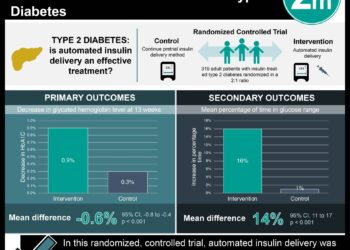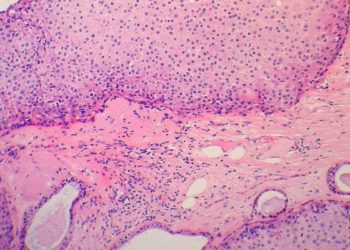Intensive diabetes treatment used inappropriately in clinically complex type 2 diabetics
1. Based on retrospective data analysis of a national cohort, although clinically complex type 2 diabetics were more likely to be managed with lifestyle changes or a single oral agent, about 20% still received intensive diabetes treatment, going against standard recommendations.
2. Patients with high clinical complexity who received intensive treatment had double the risk of severe hypoglycemia.
Evidence Rating Level: 2 (Good)
Study Rundown: Hypoglycemia may occur even in patients with non-insulin dependent type 2 diabetes mellitus (T2DM). This may be related to unnecessarily intense treatment regimens, especially amongst clinically complex patients who would not benefit from tight control of blood sugars. This study aimed to estimate the prevalence of intensive treatment and the association between intensive treatment, clinical complexity, and incidence of severe hypoglycemia among adults with non-insulin dependent T2DM.
Intensive treatment was less common in participants with high clinical complexity, but about 20% of clinically complex patients were still treated with an intensive regimen. There was a significant increase in incidence of severe hypoglycemia in participants with high clinical complexity who had intensive treatment. In these patients the risk of severe hypoglycemia nearly doubled. Strengths of the study included the large size of the cohort and using guideline based models to separate the cohort based on their medical complexity. The limitations included possible change of intense treatment plans during the two years of follow up, since they did not get re-labeled. Also, the study did not include insulin-regimen patients, who are often at higher risk for hypoglycemic events, especially if undergoing intensive control.
Click to read the study, published in JAMA Internal Medicine
Relevant Reading: Effect of Published Scientific Evidence on Glycemic Control in Adult Intensive Care Units
In-Depth [retrospective cohort study]: This retrospective analysis looked at the OptumLabs Data Warehouse administrative database which included 100 million individuals enrolled in the private and Medicare Advantage plan in the USA. They identified adults with T2DM from January 2001 to December 2011 with good control (HbA1C ≤ 7.0%). Severe hypoglycemia was identified based on ICD9 codes. Participants were distributed into high and low clinical complexity determined by an American Diabetes Association and American Geriatrics Society composite measure based on age and comorbidities. Treatment regimens were ascertained from pharmacy claims. Intensive treatment was defined based on HbA1C and specific treatment regimen. Statistical analysis includes multivariable logistic regression of risk-adjusted probabilities.
In total, 8048 patients were treated intensively. Of these, 7317 (26.5%) were considered low clinical complexity and 731 (18.7%) were considered high clinical complexity. After risk-adjustment, probability of intensive treatment was 25.7%in patients with low clinical complexity, and 20.8% in patients with high clinical complexity. A large majority of the intensively treated patients (76%) did not have their treatment regimen de-escalated after having a low HbA1C. Patients with high clinical complexity were significantly less likely to be treated intensively than patients with low clinical complexity (OR 0.76; 95%CI 0.69-0.83). Patients cared for by endocrinologists were more likely to be treated intensively. Severe hypoglycemia was significantly more frequent among patients with high clinical complexity (112 [2.9%] vs. 334 [1.2%]; p < 0.001). The risk-adjusted probability of severe hypoglycemia significantly increased in highly complex patients undergoing intensive treatment: 1.74% to 3.04%. There was no statistically significant difference between intensive treatments in patients with low complexity.
Image: PD
©2016 2 Minute Medicine, Inc. All rights reserved. No works may be reproduced without expressed written consent from 2 Minute Medicine, Inc. Inquire about licensing here. No article should be construed as medical advice and is not intended as such by the authors or by 2 Minute Medicine, Inc.







